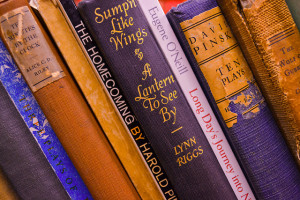You have no items in your cart. Want to get some nice things?
Go shopping
Jane Austen, Charles Dickens, William Shakespeare, the Brontë’s, Alfred Tennyson, the pillars of English literature, the fundamental authors we must read. We must learn about British history, British culture and British nationalism until we are bursting with British pride.
Chinua Achebe, Albert Camus, Arthur Miller, Gabriel García Márquez, what about their writing? Their novels and plays are no less iconic, no less important than those of English authors, yet authors such as these are being shaved from the English Literature curriculum. Last year we saw uproar surrounding Michael Gove’s order to increase English literature in classes, and to pare off international literature from curriculums. People were, rightly, flabbergasted that iconic novels such as To Kill A Mockingbird and The Great Gatsby were to be brushed aside and replaced with more pre-20th century British literature.
I spoke to Michael Datcher, author of New York Times bestseller Raising Fences and historical novel Americus, and professor of English Studies at Loyola Marymount University, Los Angeles, to tease out just how important reading literature from a broad range of cultures is.
Litro: How important do you consider reading international literature?
Michael Datcher: It’s very important to read international literature because accessing the international community through its literature gives you access to the imagination of the people. There are few ways to learn more about someone than how they use their freedom qua imagination.
Litro: How do you think it affects learning and development?
Michael Datcher: It creates empathy, which in turn creates a thirst to know more about others and ourselves. Accessing the imagination of people through international literature is far more powerful and exciting than we realise. We all have different views of the world, different ideas of what it is, what it should be and what it could be. The variety of people’s thoughts and experiences across the world is mind-blowing. Why should we stifle this when we can learn so much from one another?
The more we share and develop understanding of each other, the more innovative, creative and exciting our existence is. Without desire to understand or learn about other cultures and their views, are we not boring? We don’t reach our full potential as citizens of the world. Other communities can teach us so much not only about themselves, but about ourselves as well, and our societies and values. We can learn from the experience of others, and build on this. The wealth of ideas to consider in international literature enriches creativity. Creativity does not blossom with restriction, it flourishes with openness and variety.
Litro: By limiting curriculum to ‘English literature’ in British schools, are we in a sense encouraging a form of ignorance?
Michael Datcher: It’s encouraging a dangerous Anglo-centric approach to knowledge acquisition. Dangerous in that it undermines the respect for the imagination of peoples around the globe.
Litro: If we only teach/study British canon texts, do we develop a narrow view of the world? How do you reckon, if so, this affects adulthood?
Michael Datcher: Yes, it encourages a narrow view of the world and it creates a fear and misunderstanding and lack of respect for people who are not of your tradition.
Only teaching English literature teaches a one-sided view of the world and its inhabitants. It encourages ignorance, a them-and-us narrative. It isolates us from the rest of the world, and in doing so creates a sense of hierarchy and superiority within our community. Reading multicultural literature encourages sensitivity and awareness. But then again, the issues shared in multicultural literature of course do not occur in England. We in England definitely do not face international issues such as rape, racism, elitism, overindulgence, loss or love, as depicted in To Kill A Mockingbird and The Great Gatsby, do we? Of course, it is fundamental that students are taught British culture and history, but education needs more excitement and variety. From my experience, reading Dickens at age 16 is unlikely to spur any sort of enthusiasm towards literature in most students, but learning about Afghan culture in Khaled Hosseini’s The Kite Runner, however, may spark interest. If we aren’t exposed to and taught about different nationalities and traditions, how are we to develop into well-rounded adults? As the rest of the world becomes more international and celebrates multiculturalism in life and arts, we seem to be stepping backwards. If we aren’t teaching about other systems and philosophies we are, in a sense, teaching that ours are the only valid ones. This seems frightening, does it not?
Litro: Having researched and written a historical novel, Americus, how important would you consider it for people to read historical novels of other countries and cultures? Why?
Michael Datcher: Reading historical novels is critical because they are a beautiful melding of imagination and history. When you can access the imagination AND the history of a community of peoples, it can be instrumental in better understanding their journey—and by extension, better understanding their souls.
Teaching solely one-sided British narratives creates a false sense of knowledge and understanding of matters that require deep consideration from various angles. Although it is highly unrealistic to suggest that we should learn every single angle of every story, the crux of the issue is that we can never be too informed about the people we share our existence with. We will never know every side to every story, but we should try and understand as much as we can, and engage with other cultures. The world does not revolve around Britain. Content for English literature classes should be broadened as far as it can be, not restricted. Talent should define status, not heritage.

About Isabel Gonzalez-Prendergast
Isabel is particularly interested in international literature, learning about different cultures and philosophies.





Jane Austen, Charles Dickens, William Shakespeare, the Brontë’s, Alfred Tennyson, the pillars of English literature, the fundamental authors we must read. We must learn about British history, British culture and British nationalism until we are bursting with British pride.